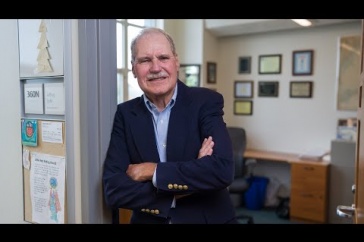
Eric Skyta '15 in the Great Hall at the Peter T. Paul College of Business and Economics
Eric Skyta says it was during his junior year that he really got hooked on the idea of a sales career. He took a course called Selling Yourself. “We learned how to present ourselves in the business world,” Skyta says. “How to dress, how to interview, the sales process. But what it really taught me was that selling yourself is the most important thing, because no matter what your job is, you’re going to have to sell yourself and sell your ideas.”Eric Skyta is persuasive. As a high-schooler, he persuaded his grandfather to loan him money for a commercial-grade lawn mower so he could expand his landscaping business. As a UNH freshman, he convinced his friend’s roommate to swap rooms with him in Fairchild Hall. And when he and his friends went in on a house rental senior year, he convinced the landlord to let them fix it up a bit in exchange for a break on rent. “We made a nice little deal,” says Skyta.
But persuasiveness isn’t necessarily what gives the recent Peter T. Paul College of Business and Economics graduate a knack for his speciality — sales. “I just love talking to people; getting to know people better is what sales is,” says Skyta. “You may be selling a product, but in reality it’s the people. You need them to like you, you need them to trust you — trustability is huge.”
Skyta expanded the landscaping business to 30 accounts and quickly paid back his grandfather. When it came time for college, the New Jersey native ticked down a list of the “best snowboarding schools,” scheduled visits and fell in love with what was number four at the time — UNH. “I went to accepted students’ day and met professors in the business school and realized this is where I want to be, where I belong.”
He entered as an economics major but got involved in the sales club early on after attending a meeting with his roommate and being “blown away” by the professionalism of the club’s advisor. “We were like, this is what we’re going to do. So we started as freshmen just being part of the club and going to meetings, then we really started getting into it,” Skyta says. He eventually changed his major to entrepreneurial studies. When the advisor left the university between Skyta’s junior and senior years, he stepped in as club president and, together with a team of classmates who also stepped up, kept the club running.
Looking Back on a Lesson

Eric Skyta says it was during his junior year that he really got hooked on the idea of a sales career. He took a course called Selling Yourself. “We learned how to present ourselves in the business world,” Skyta says. “How to dress, how to interview, the sales process. But what it really taught me was that selling yourself is the most important thing, because no matter what your job is, you’re going to have to sell yourself and sell your ideas.”
“It was a challenge to keep it going. I learned so much about management. I had run a business, but I’d never been in charge of 75 people. I learned to delegate,” he says.
And improvise. This past March Skyta and team executed the annual Sales Competition, a premier event for sales and marketing majors who pitch their wares to 20 judges from regional companies. The night before the event, Skyta got a call from the keynote speaker who was snowbound in New York and wouldn’t be able to make it.
“It taught me a lot about what can happen,” says Skyta, who scrambled to make other arrangements. Arnold Garron, Paul College dean at the time, stepped in. “It was a lifesaver,” Skyta says. And it helped the club pull off an event that he says changed lives.
“It sounds cliché, but there were kids who had been saying, ‘No, I don’t want to do that. I’d rather sleep in,’ but because of this event that our team put together, people have jobs that they wouldn’t have had. People who didn’t think about sales as an option placed in the competition and are now employed. And they had no clue what they would do. To be a 22-year-old senior, to be able to say I got to do that, that is something that means a lot to me as well as my team.”
He says there is no one entrepreneur that he admires most, but he likes bits and pieces of many. Dunkin’ Donuts founder Bill Rosenburg is someone he can relate to. “He didn’t make it past eighth grade,” says Skyta. “He learned from the streets and from doing. That’s how I learn.”
It’s the streets of Central America where Skyta will learn starting this fall when he kicks off a year of travel near the equator, starting in Colombia, where he’ll “hammer out Spanish,” then making his way northward. Skyta says he could get by on his limited “Spanglish,” but he doesn’t want to just get by. “I want to be in it. I want to be part of the culture, not a spectator.”
This article is part of the series The Places They'll Go, which looks at where graduates of the class of 2015 are headed. Go to series
On Dough and Donuts
Dunkin’ Donuts founder William Rosenberg didn’t make it past eighth grade because the country was in the midst of the Great Depression when he turned 14 in 1930. Instead of entering high school, he took a job delivering telegrams for Western Union to help support his family.
It was a move that paid dividends in the short and long term, as Rosenberg laid the foundation for what would become a wildly successful career that, 25 years later, brought the Dunkin’ Donuts franchise into existence.
Later in life, Rosenberg donated his New Hampshire estate to UNH with the expectation that the university would sell the property and use the proceeds to open a franchise research center. In 2002, the university opened the Rosenberg International Franchise Center and dedicated a chair in franchising and entrepreneurship in Rosenberg’s name.
Today, the center is recognized as one of the world’s leading teaching and research hubs for franchise finance and international risk assessment. The center conducts research in partnership with top ranked universities in Europe and the Pacific Rim region.
Earlier this year, Dunkin’ Brands, Inc. donated $250,000 to the center to fund new courses, expand research and create an online International Franchise Hall of Fame.
-
Written By:
Tracey Bentley | Communications and Public Affairs

















































